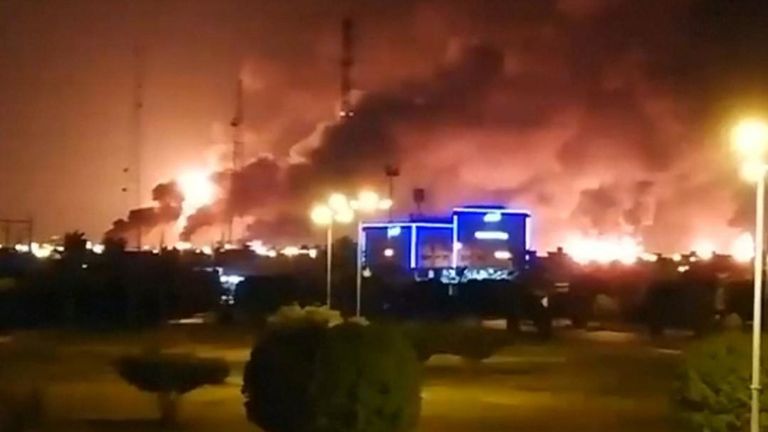Riyadh: Saudi energy giant Aramco is battling to reassure markets after devastating attacks on two oil plants, where a prolonged shutdown risks roiling investor confidence ahead of the state-owned giant’s mega stock listing, analysts have said.
A wave of drones struck ‘Abqaiq’ – the world’s largest oil processing facility – and the ‘Khurais’ oil field in eastern Saudi Arabia, knocking out nearly half of the kingdom’s crude production and exposing the vulnerability of its energy infrastructure.
While Tehran-backed Yemeni rebels claimed responsibility for the pre-dawn strike Saturday, Washington blamed Iran for what it called an ‘unprecedented attack on the world’s energy supply’.
It is a major test for the kingdom’s newly-appointed energy minister Prince Abdulaziz bin Salman – a half-brother to the Crown Prince – as the attacks could dampen investor confidence in Aramco’s upcoming two-stage stock market debut.
The attacks have effectively turned off six per cent of the global oil supply, raising the possibility of a spike in prices when markets re-open Monday – even as Aramco said it will tap into its reserve stockpiles to offset the disruption.
“The worst case scenario (for pushing oil prices higher) is an incident that takes a large amount of oil production offline in Saudi Arabia,” energy expert Robert Rapier wrote on ‘Forbes’ online.
“If they can get production back online pretty quickly – or at least assure the markets they can – you might not see an enormous price spike,” Rapier added.
But the full extent of the damage at the plants and how long it will take to repair is unclear, with analysts warning that an absence of information could fuel trader speculation.
Saudi authorities, known for their penchant for secrecy, have not allowed reporters near the plants where security has been tightened since the attacks.
Seeking to soothe market jitters, Aramco CEO Amin Nasser has said ‘work is underway to regain the (lost) production quantities’.
‘Bloomberg News’ reported that Aramco expects to restart most of the operations ‘within days’.
“Saudi Arabia has plenty of oil stored to fulfil customer demands and don’t think Aramco will lose money over this,” said Ellen Wald, author of the book ‘Saudi Inc.’. “This isn’t a company that has to pump and sell to make payroll like a tiny fracking outfit,” he added.
Saudi Arabia is known to have vast underground storage facilities with a capacity of tens of millions of barrels of various refined petroleum products that can be tapped during times of crisis.
The strikes are unlikely to derail the much-touted initial public offering (IPO), but it could undermine investor confidence in the mammoth listing that the government hopes will raise up to USD 100 billion. It could also impact its valuation.
The use of seemingly low-grade drones to strike the world’s most profitable company highlights the easy vulnerability of oil infrastructure in the kingdom, which has splurged billions on sophisticated defence equipment.
Unlike other major suppliers like the US and Russia, which rely on numerous producers spread out over large geographical areas, Saudi Arabia’s production is reliant on a single entity – Aramco.
This leaves the world’s top oil exporter comparably more vulnerable to a crippling production shutdown in the event of an attack according to experts.
AFP
